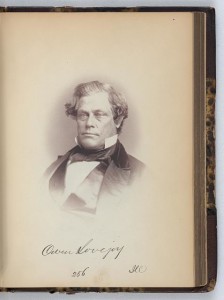The April 9, 1864 issue of Harper’s Weekly (at Son of the South) eulogized an abolitionist Congressman from Illinois:
OWEN LOVEJOY.
IN OWEN LOVEJOY the cause of Democracy loses a noble champion. From the moment that he rose from the side of his brother, murdered by the hate of free Democratic principles, down to the last time that be opened his lips to speak, he was the cheerful, steady, fervent advocate of the great American principle. A characteristic and faithful American, whoever studies his character will see the kind of moral heroism and dignity produced by our distinctive principles.
In his earlier career he was a clergyman, and he did not leave his faith behind him, but took it with him into Congress as he carried thither his generous heart, gemal temper, and trenchant speech. His companions in Congress of every party-sympathy mingled their regrets over his grave. Mr. ODELL, of New York, in whose neighborhood, in Brooklyn, Mr. LOVEJOY died, said that his efforts to suppress the rebellion were paramount to every other consideration. Mr. PENDLETON, of Ohio, said that what Mr. LOVEJOY believed he expressed, and was at all times prepared to defend his positions. Mr. STEVENS, of Pennsylvania, said that he was not afraid to vindicate the right any where. Mr. FARNSWORTH, of Illinois, knew him as, a good neighbor. Mr. ALLEN, of Illinois, found him always pushing vigorously on to promote what he thought the interests of his country and race. Mr. WASHBURNE, of Illinois, declared him wise, vigilant, incorruptible.
They are noble words to be truly spoken of any man; nor will any one doubt that they were true of him. His name as the brother of ELIJAH P. LOVEJOY—as much a martyr to liberty as NATHAN HALE–and for his own brave words and unspotted life, will be always noted in our history. The laborers are called away, but the work goes on. Devotion to the Democratic principle of equal liberty before the laws must be its own reward. With OWEN LOVEJOY it was so. His steady soul pursues its career ; but wherever it may be, its faith in the love of God and the brotherhood of men is no surer than when his visible life illustrated it.
was an American lawyer, Congregational minister, abolitionist, and Republican congressman from Illinois. He was also a “conductor” on the Underground Railroad. After his brother Elijah Lovejoy was murdered in November 1837 by pro-slavery forces, Owen became the leader of abolitionists in Illinois. … Owen was present on the night of November 7, 1837 when his brother Elijah was murdered while trying to defend the printing press of the Illinois Anti-Slavery Society from an angry mob. He is reported to have sworn on his brother’s grave to “never forsake the cause that had been sprinkled with my brother’s blood.”
After the pro-slavery mob in Alton, Illinois shot and killed Elijah Parish Lovejoy, it destroyed Elijah’s printing press and threw the pieces into the Mississippi. Owen and his brother Joseph wrote Memoir of the Rev. Elijah P. Lovejoy; who was murdered in defence of the liberty of the press, at Alton, Illinois, Nov. 7, 1837. As you can see from the link I threw into the Harper’s piece Wendell Phillips defended Elijah for sacrificing his life defending the freedom of the press.

